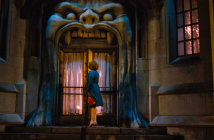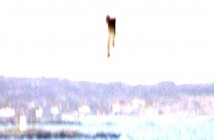Roxanne (2013)
Cast: Ingrid Bisu, Mihai Calin, Anghel Damian
Director: Valentin Hotea
Country: Romania | Hungary
Genre: Drama | Family
Editor’s Notes: The following review is part of our coverage for the Film Society of Lincoln Center’s Making Waves Romanian Film Festival, which runs from December 4 to December 8. For more information visit FilmLinc.com and follow FilmLinc on Twitter at @FilmLinc.
I heavily dislike it when a film with so much promise on paper, ends up being a bit of a let down in the end. Romania has a complex history and an even more complicated recovery with democracy after the fall of Ceausescu. Roxanne is inspired by real events in debut director Hotea’s life and the lives of modern day Romanians.
Servan Pavlu plays Tavi, a former punk who’s become a somewhat successful businessman. In his late thirties he looks into his now available communist secret services file and learns that he might be the father of his high school sweetheart, Roaxana (Diana Dumbrava). Another driving part of the film is Tavi’s search for a mysterious person called “The Captain.” His dedication of Roxanne by The Police to his girlfriend on Radio Free Europe was reported by The Captain and led to an investigation into his life and that of Roxana. Roxana is now married to one of Tavi’s childhood friends, Sandu (Mihai Călin). Other subplots include Tavi’s obsession with getting to know his possible son, his strained relationship with his live-in girlfriend, and dealing with the consequences of his mother’s (Valeria Seciu) advancing Alzheimer’s.
Most of the performances fall flat where they should be powerful. The only two that shine are Anghel Damian who plays the spirited young Victor (Roxana’s son) and Valerie Seciu’s touching portrayal of Tavi’s mother.
There’s much for the director to work with in this film. Tavi is immature and facing entanglements from his past which follow him to his present and which may affect his future. The inclusion of his mother’s fading memory is a poignant allegory that while Romania tries to move on from its past, it tries to resolve it to find a new identity. Tavi teaches his mother to use a two-step phone so she can call him if she needs help. She reluctantly tries it out puzzled at why she needs one when she can reach him any way. Her presence evokes stagnant life she symbolizes an awareness that he cannot move on until he decides what to do with her.
The subject matter is also dark considering all those years the general populace had to survive an environment under surveillance. Friends and families were pitted against one another. This film suffers from a case of the potentials unexplored. Tavi’s struggle may be complicated, but the best the Hotea’s direction does is to imply a moral crisis or mildly point out a glaring early prediction. It’s too bad because having seen Pavlu’s affecting performance in The Japanese Dog earlier this year, I would have liked to have seen this actor used well. The only connection conjured is through an interwoven soundtrack that combines nostalgia and modern independent fare. As The Police plays prominently in the opening scenes, post-punk/electro Romanian band Dekadens plays softly in another. It’s an interesting musical changing of the guard: where labeled Western pop was the voice of rebellion local indie groups become the voice of a hopeful youth.
Most of the performances fall flat where they should be powerful. The only two that shine are Anghel Damian who plays the spirited young Victor (Roxana’s son) and Valerie Seciu’s touching portrayal of Tavi’s mother.
A story with such a huge political impact deserved further digging. The characters merited more than just subdued acting from the film’s performers. It’s surprisingly lighthearted fare and I wish it had been better.
A story with such a huge political impact deserved further digging. The characters merited more than just subdued acting from the film’s performers. It’s surprisingly lighthearted fare and I wish it had been better.




